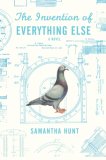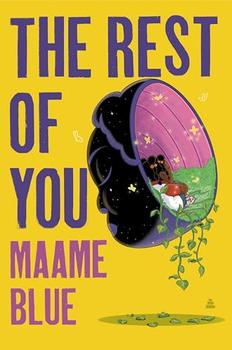Page 1 of 2
There are currently 12 member reviews
for The Invention of Everything Else
-
Cheri (Grand Rapids MN)
The Invention of Everything
Magical. The words,the actions, the emotions, transforms you into the author's world in a blink of an eye. And what a world it is...the characters are well written and the story catches you from the first word and keeps you hanging until the last. I read this book as I traveled on my treadmill (it is a blustery Minnesota winter) and ended up walking further then usual in order to finish the book and figure out the mysteries. Thank you for the opportunity to read something I might otherwise have passed up in the store. It was well worth it.
-
Betsey (Austin TX)
Lyrical, lovely, ethereal
Samantha Hunt's novel is a "what if" historical fiction on the last months of the life of Nikola Tesla, the inventor of alternating current electricity. His life was much obscured by the better known Thomas Edison; however, as this book well illuminates, Edison was more rigid, capitalistic, and less visionary than Tesla.
This book is allegorical and metaphorical. Although we learn about Tesla's Serbian roots, his boyhood, and the inner workings of his great mind, Hunt shines even more light on his heart. She does this with aspects of time travel, with his relationship with pigeons, and a fictional relationship with an astute and intelligent chambermaid at the Hotel New Yorker, where he lives the last years of his life.
There is much inner dialogue from the main characters of the story, which makes it a more character-driven than a plot driven read. There is definitely a plot, and suspense, but the texture of the tale and the beautiful turns of phrase and imagery stay with you long after the story ends. Hunt weaves in concepts of psychology, philosophy, and literature, giving the story many dynamic layers. This novel is a novel of ideas as much as it is a fictional biography on the life of a genius. I wanted to ask the author if she had read "Hopeful Monsters," by Nicholas Mosley, as there are strong parallels about the elusiveness of time and the enigma of the human heart, as well as specific references to Goethe. Additionally, both authors are exceptionally open and generous writers and do not borrow from religion in order to hold high values and ethics. I look forward to Samantha Hunt's next novel.
-
Stephanie Chance (Prattville AL)
Extraordinary!
This book is full of eccentric, interesting characters. A little bit of history, a little bit of fantasy and time travel... It reminded me a little of Audrey Niffenegger's The Time Traveler's Wife in that you have to suspend your disbelief, but it is ultimately rewarding. The thing I love most about this book is that it sparks my interest in learning something new. I had no idea who Nikola Tesla was before I read this, but now I am glad that I do know about him and his contributions to society. I particularly enjoyed the theme of conflict between invention for invention's sake and invention for fame. Thomas Edison as foil for Tesla in this regard was a surprising and thought provoking element. I definitely recommend this book to any reading group whose members like to be challenged.
-
Judith (Pittsburgh PA)
Buy this Book!
I absolutely loved this book!
Whether you are a Tesla fan or know nothing at all about the man, you will love this book too. I found the characters well developed and interesting. The story was thought provoking and fascinating although it does move slowly in the beginning. Hunt's description of flight (literally) pulls the reader into weightlessness.
I will forever be curious about pigeons and electricity.
-
jeana (ardmore PA)
The Invention of Everything Else by Samantha Hunter
This is a book filled with luminance, suspense and mystery. In the first few chapters the mystery deepens because we are never quite sure who is who, or where, or when. As we travel with the author we begin to understand that we must always ask, who is who, and where, and when? Hunt leads us through theories of time travel, energy amplification and electricity, blending the ideas and theories of the great, unsung scientific genius of our times, Nikola Tesla, with ideas that remind us more of H.G. Wells’s fiction. In fact, Wells is obliquely referred to via reference to Orson Welles’s famous radio broadcast of the 1930’s and the appearance of a machine for time travel.
Two editorial decisions make the book more difficult to follow than it needs to be: first, a lack of footnotes and attributions will confound readers unfamiliar with Tesla’s accomplishments; and second, the creation of fictional characters who play the roles of real-life individuals causes us to wonder why they have been singled out for anonymity, especially considering the large cast of historical figures.
On the delightful side, the author’s writing style is charming, with many turns of phrase for readers to savor, such as “living as they do on the opposite ends of the sunlight” to describe a father and daughter who work night and day shifts, respectively. Or, near the end of the book, a memory of “a day, years ago now, when I’d asked him what the word ‘scintillating’ meant. He hadn’t quite known the answer, so between the two of us, we made a decision. From then on ‘scintillating’ would be used to describe those moments when the right word just can’t be found.”
This book is a scintillating read.
-
Cynthia (Puyallup WA)
The Invention of Everything Else
Samantha Hunt uses her characters to bring the invisible world before us to examine - you may never look at a speck of dust quite the same! Though the book is steeped in science, it does not overwhelm the reader with minutiae - the writing style is wonderfully enriched. As the characters tinker with time so then, does the author - she walks you through the grandeur of the Hotel New Yorker and the streets of mid-twentieth century Hell's Kitchen in such beautiful detail that the imagery is complete in your mind.
-
Emily (Arlington VA)
Homage to Tesla perfect for the silver screen
This is the first book that I've been tempted to review for BookBrowse.com. The book concerns the life of one of my favorite historical figures. It is rumored that Nikola Tesla developed his inventions, including the polyphase ac generators, as a synasthete would, by seeing the finished machinery working in a vision as the inception or the impetus for his analytical process of invention. This book reads as if it were originally conceived as a fully finished film. The chapters are all composed as dramatic acts of a stage play. Each progression in the book is perfectly separated from the rest by a change in scene, set-up of character, and a preamble literary quote perfectly capturing the theme of the coming chapter. The book touches on events that transpire over the 86 years of Tesla's life. The presence of the other characters in the story, along with the omissions of several key background events and other information, enforce the message that the book is written to deter people from becoming so focused on single loves or inventions that they let those inventions occlude their vision. I could almost hear the author whisper gently that it is the passionate, the single-minded who perish, while it is those who can handle loss who will progress to see the invention of everything else.




